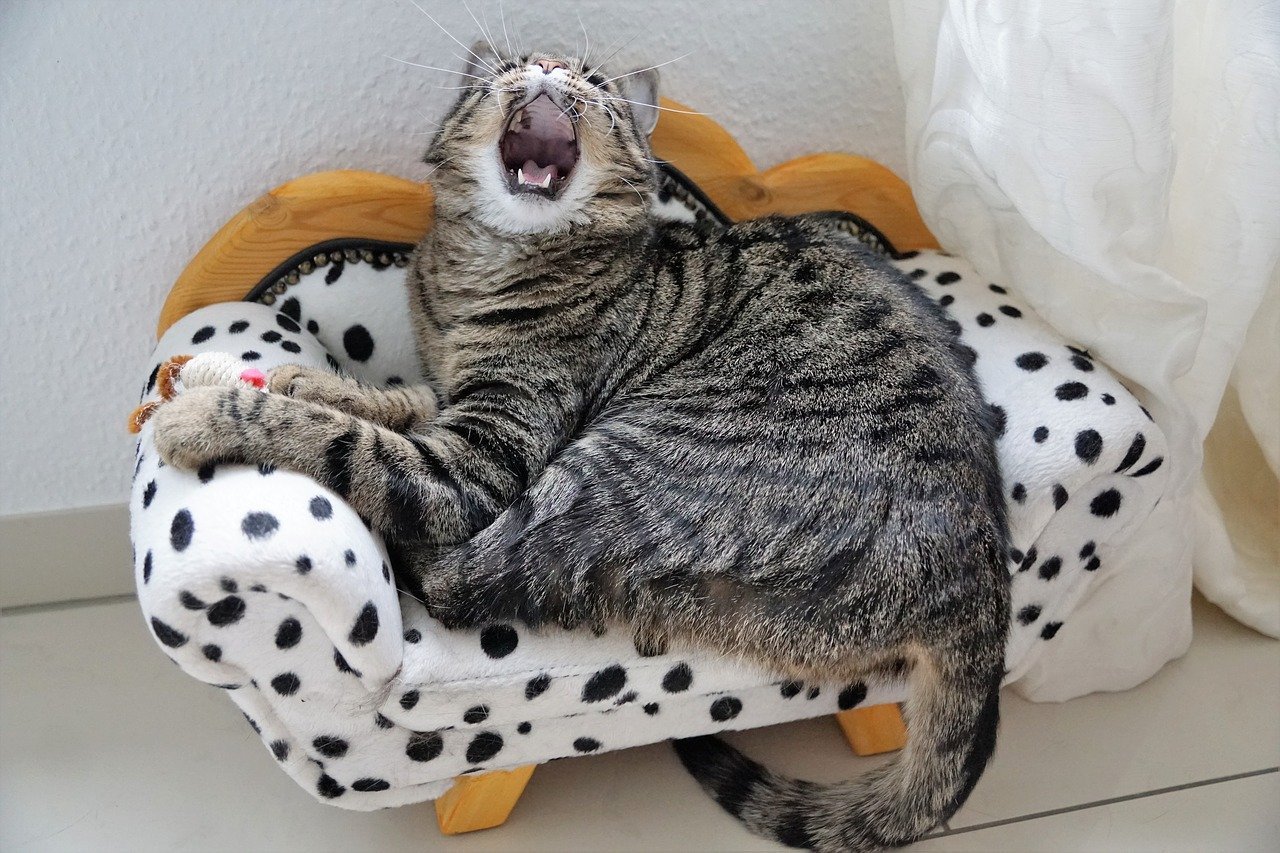If you’ve ever stayed up late during the summer months, you’ve probably heard the horrifying screeches of the neighborhood cats. But why do cats yowl at each other like that? The most likely explanation is that the cats are territorial or fighting over potential mates. If you catch your pets yowling at each other, you can put an end to it by:
- Distracting them with loud sounds or spritzing them with water
- Putting them in different rooms
- Spaying or neutering them
- Introducing them correctly
Why Do Cats Yowl at Each Other?
Cats yowl at each other to communicate and express themselves.
- They may do this when they are feeling excited, fearful, or aggressive as a way of expressing their emotions.
- Cats also yowl to establish territorial boundaries and deter intruders from entering their perceived area of ownership.
- Additionally, cats may yowl when looking for a mate as a way of signaling their availability.
- Finally, cats may also yowl in response to something they are feeling or experiencing, such as pain, hunger, or fear.
It’s important to remember that cats have different ways of communicating, and it’s essential to observe your cat’s body language to understand their behavior better.
The Basics of Feline Communication
In my experience, cats rarely meow at each other — after all, that vocalization is pretty much reserved for humans. Instead, it’s how cats greet their owners and express their need for attention, food, or other desires.
However, they don’t use that particular noise to communicate amongst themselves. Intraspecies communication in felines naturally sounds more aggressive to our ears. Cats only “talk” to each other when expressing displeasure. They can convey pretty much any different feelings nonverbally.
So when I see my cats get into that defensive frame of mind and start hissing or yowling, I get rightfully concerned. Add to that the uninterrupted staring, general stalking posture, and raised heckles, and you have a fight brewing. But really, sometimes the stand-off doesn’t move past the yowling stage.
Of course, cats can yowl for other reasons as well. For example, it might signal that the cat is in pain or experiencing cognitive dysfunction. Then again, if none of those things are true, it could just be boring. We all sing to ourselves from time to time, don’t we?
But Why Do Cats Yowl at Each Other at Night and Only During a Certain Time of Year?
I want to answer one of the most commonly asked questions about cats’ yowling habits. Even if you’re not a pet parent, you’ve probably noticed that street cats exclusively sound off at night. And that can be particularly strange if your neighborhood looks cat-free during the day. So why do cats yowl at each other at night?
There’s a simple explanation here — cats are nocturnal. Therefore, we don’t see many out during the day because they’re probably napping. But, then, they might yowl at night because they’re trying to defend their hard-earned territory from would-be usurpers.
For people who don’t have cats, the second part of this question may be even more perplexing. Why do we mostly hear street cats yowling during certain times of the year? Well, it all comes down to heat cycles.
Even though felines don’t technically have a set breeding season, it usually comes in during the warmer months. In the Western Hemisphere, that’s generally between March and September. So if you’ve noticed an increase in ferocious howling, that may explain why.
How Can I Make My Cats Stop Yowling at Each Other?
So now that we know that yowling is usually a sign of a cat’s territorial nature coming out, what can we do to stop it?
Distract the Cats
If your house cats are yowling at each other and exhibiting some of the other aggressive behaviors I’ve mentioned, you should act immediately. First, distract them by clapping your hands loudly or tossing a pillow or another soft object near them. Alternatively, if you often have to discipline your cat, you can keep a spray bottle full of water nearby.
Whatever happens, we mustn’t respond to our cats’ aggressive behaviors with more aggression. Notably — and understandably — cats don’t react well to being physically disciplined. It only makes them more violent, in turn.
Put Them in Separate Rooms
If distraction techniques don’t work out, you must separate the cats. But, as we have established, this vocalization is likely just the beginning of an all-out war. So we must take steps to ensure that the fight it’s leading up to doesn’t happen.
Some people will tell you to let the cats duke it out amongst themselves, but that’s the opposite of what you should be doing. Remember: cats are predators; they have claws for a reason. If you let them try to sort out their differences, they may seriously injure each other.
To prevent that, deposit each cat in separate rooms and let them cool off. After all, they’re solitary creatures by nature, so they’ll appreciate the time out. But if they’re aggressive, try to corral them without touching them.
I recommend using a large pillow to direct one of the cats where you need it to go while keeping your eye on the other. Agitated cats have been known to take a running stab at the back of people’s knees.
Try Getting Them to Play Nice Tomorrow
When you have the cats in their separate areas, you’ll need to keep them apart until you’re sure they’ve calmed down. Please don’t rush the cooling-off process, but don’t prolong it. They’ll need to learn to tolerate each other at some point. It’ll be better for everyone involved if you don’t let them dwell on the fight for a long time.
So ensure you return them to the same room no later than the day after the fight. Entertain both cats to prevent them from starting staring competitions or screaming matches.
Spay or Neuter Your Pets
You may have noticed that yowling is pretty much reserved for adult felines. So why do cats yowl at each other as adults but not when they’re kittens? As we have established, it may be related to their natural mating cycle.
For example, male cats will often try to protect what they perceive as their territory or secure mating rights. But, of course, if that means fighting another cat, they’ll gladly do so.
However, one way to avoid all that unpleasantness is to spay or neuter the cats. The procedure can be done anytime during a cat’s life, but some recommendations exist. For example, most experts suggest that kittens should be spayed at five or six months of age. But a cat is never too old to benefit from neutering — though it might feel the effects of the change more powerfully.
Preventative Measure: Introduce the New Cat Properly
Being careful about introducing your cats is one of the best ways to keep them from fighting. As we have established, you shouldn’t let them duke it out the first time they meet. If you’re worried about aggression, you shouldn’t even let them see each other initially.
Instead, you’ll want to build positive associations with the other cat by switching their main hangout spaces and letting them eat on opposite sides of a door. That will allow both cats to get used to the other one’s scent before they even get to interact.
Moreover, even when you let them spend time in the same room, you must ensure both cats have something to do. For example, get a friend or family member to play with one cat while you lure the other into the same room with treats or toys.
Whatever you do, don’t let the two cats stare each other down in that menacing way — you’ll know it when you see it. That staredown can quickly escalate into yowling and brawling.
Most importantly, ensure introducing a new cat doesn’t alter your existing cat’s schedule. Cats are creatures of habit, so continuing a strict routine should alleviate any stewing aggression. For example, keep feeding your old cat at the same time you always have, and play with it like you usually would. Generally, please don’t make it feel neglected in any way.
Why Do Cats Yowl at Each Other? Final Thoughts
Unlike meowing, prolonged yowling is usually an indicator that something is wrong. If you see a cat just yowling into the void, you’d be right to assume it was hurt, sick, or maybe just bored.
But why do cats yowl at each other? As we have established, that usually happens because they feel protective of their territory or potential mates. Ultimately, if you catch your pets yowling at each other, the best action would be to distract and separate them until they cool off.
[su_box title=”Affiliate Disclosure”]This website is supported by its readers. Please assume that all links are affiliate links. If you make a purchase from one of the links we will make a commission from Amazon. Thank you.[/su_box]





